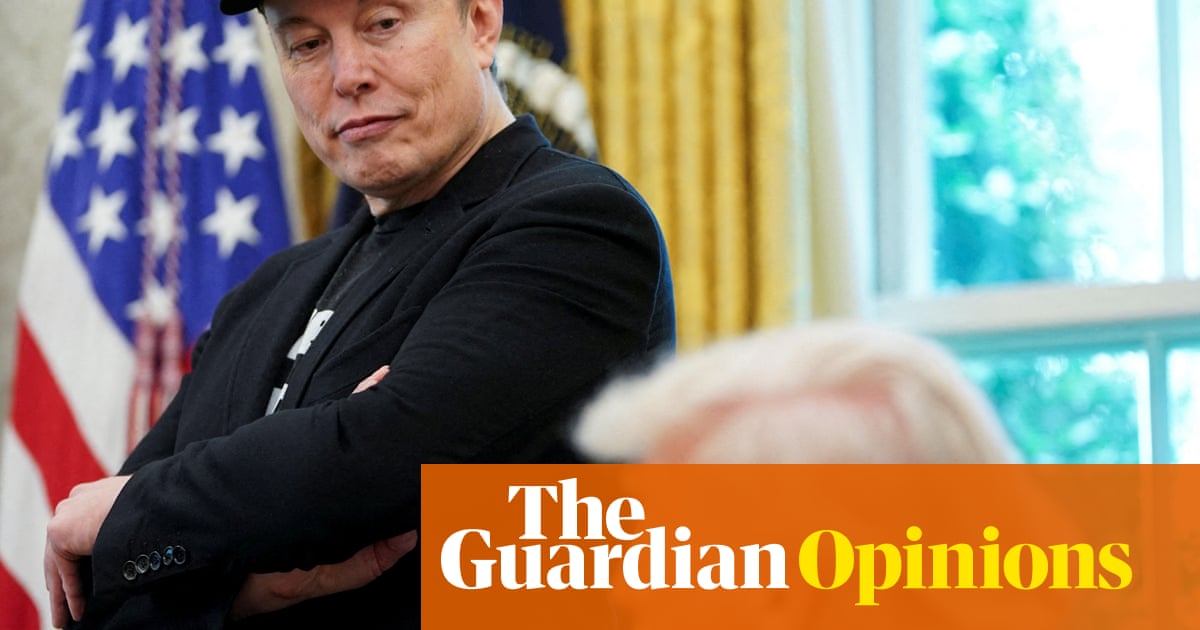Ever since the world’s richest person, Elon Musk, threw his financial weight behind Donald Trump’s 2024 presidential campaign and appeared hopping around idiotically behind the candidate at a rally stage, political observers have wondered what would instigate the two men’s inevitable falling out.
Would it be a matter of competing egos, with each man resenting the power and influence of the other? Would it be a matter of clashing cultures, with Trump’s sleaze rubbing the wrong way against Musk’s Silicon Valley creepiness? Would it be an ideological clash, with the paleocon nationalists of Trump’s dwindling inner circle turning against Musk’s cadre of teenage Doge hackers and cosmopolitan techno-reactionaries?
It was bound to be something. Trump, after all, is not known for his ability to maintain cordial alliances – not even with those who have been as useful as Musk has been. Trump’s first term, to say nothing of his pre-presidency career, was marked by soured alliances, public remonstrances against onetime partners, and brief, disastrous tenures by employees and advisers who quickly left, angry. Musk, meanwhile, is known for his uncommonly odious personality, a management style that is euphemistically called “mercurial”, and his own increasingly erratic behavior, which includes clashes with a harem of women bearing his children, anallegedly problematic and escalating drug habit, and rumored bladder problems. It’s not just that these are not very smart guys; it’s that they are guys whose power and money has inflated their egos to such a pathological extent that they are no longer stable, or even especially functional. They would be sad enough cases if their personal deteriorations did not have world-historical consequences; if they hurt only themselves and did not create so much needless suffering for others. As it is, these men were bound to turn on one another and their inevitable fight was bound to reorient the Republican party – casting doubt on the unsteady coalition of new media types, manosphere influences and money that had carried them to victory in 2024.
When it finally came this Thursday – with Trump and Musk posting increasingly hostile invective against one another on their respective proprietary social media platforms, Truth Social and X – the fight seems to have been largely about money. Trump posted that Musk had left the administration angry at cuts to electric vehicle subsidies and called for government contracts with Musk’s companies to be cancelled; for his part, Musk began a series of posts in which he claimed that Trump was named in the government’s Epstein files – “That is the real reason they have not been made public,” he said – and reposted tweets calling for Trump to be removed from office. Musk claimed credit for Republicans’ 2024 victory, and called Trump “ungrateful”. Tesla stocks plunged. Soon various rightwing media and Trump-world figures began getting in on the action, lining up behind Trump or Musk with the frightened, needful air of children whose parents are divorcing.
Trump seems to have soured on Musk some weeks ago, when it became clear that Doge, Musk’s frenetic and aggressive extra-legal, cost-cutting venture that had sought to gut the federal bureaucracy in pursuit of the billionaire’s libertarian worldview, was chaotic, inefficient, and above all, wildly unpopular. Musk, meanwhile, was angered by Trump’s trade war, which threatened the value of his companies, and by the Trump domestic policy bill, which cut the federal subsidies for electric cars that have benefitted Musk’s auto company, Tesla.
For his part, Musk has always had enemies within the Trump camp: Steve Bannon, the rightwing nationalist, had in fact always hated the South African billionaire, even if they shared a love of certain arm gestures. Unflattering leaks about Musk began appearing in the press, some of which seemed intended to embarrass him. Musk launched a media tour announcing his departure from the Trump administration and hinted at his frustration with the Trump administration and a broader anti-Washington grievance. He began posting about his distaste for the president’s bill; on his last day at work in the Oval Office, he showed up with a black eye.
The feud creates new pressures for Republican politicians, who must now choose between angering Musk, whose money could fund a primary challenge to any of them, and provoking Trump, whose approval can make or break their political careers. And it presents a unique opportunity for Democrats, who now have an unprecedented opening to kill the Trump bill, exploit instability in the Republican coalition and widening fractures within the Maga coalition, and remind their voters that the Trump regime is not only corrupt but also incompetent – spiteful, petty and unable to agree on anything except for a shared desire to loot the government and deprive the people for the sake of further enriching the billionaire class.
The Democrats have long been tepid and uncertain in the face of Trump’s second term, with a gun-shy and easily spooked party leadership scolding progressive politicians and the activist base alike to not oppose Trump-Musk, but to let them implode on their own. Now they have. The moment has come. It is up to the Democrats not to waste it.
Moira Donegan is a Guardian US columnist
